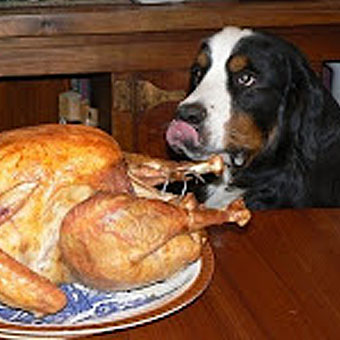Sharing these Thanksgiving goodies with our pets can put their health in jeopardy, but many of us do it. Over 60 percent of pet owners confess to sharing their holiday meals with their pets, but that doesn’t make it wise. Here’s why.
Dog’s and cat’s digestive systems thrive on a stable, consistent diet. Toss in a few leftovers and your pet will respond with a thankful tail wag but could leave him with gastroenteritis, and leave you with vomit and diarrhea messes sprinkled about the house.
Sharing Thanksgiving leftovers can risk more than just an upset belly though. Feeding human food to our pets can trigger pancreatitis, an inflammation of the pancreas that results in the release of digestive enzymes into the abdomen. Pets with pancreatitis develop vomiting, diarrhea, lack of appetite, and abdominal pain, often demonstrated by a hunched abdomen. Pancreatitis is painful and life-threatening and may result in bleeding disorders or heart arrhythmias. Treatment for pancreatitis includes hospitalization, intravenous fluids, pain medications, and anti-nausea medications.
Pancreatitis risk is greatest in obese pets or those that ingest especially fatty foods like greasy meat trimmings, sauces, and other rich side dishes. Be especially cautious with Schnauzers, who have an increased risk of pancreatitis due to breed predisposition.
Thinking of handing that turkey bone to your dog? Fugettaboutit! Any bones even cooked bones have the potential to splinter, damage the digestive tract, or cause an intestinal obstruction. Bone chewing also leads to damaged, chipped teeth which may require root canal surgery or surgical removal. You are better off to just brush those pearly whites than risk tooth pain and a costly dental procedure.
If you are looking for a safer way to include your pets in the holiday cheer, have a handful of pet treats on the ready. Better to stick with snacks you are certain will agree with your pet’s digestive system. But if you must look on the table for your pet’s treat, offer a small amount of white turkey meat without the skin or bones. Skip the sides, sauces, and desserts. And be wary of foods that are toxic to pets such as raisins, grapes, onions, macadamia nuts, and chocolate.
After the meal is done, do a thorough cleanup and discard the turkey bones in a secure, outdoor garbage can away from pet access. Store leftovers in the refrigerator or where pets cannot reach them. Keep on the watch for the curious pets with a nose for trouble. Pets will ingest the turkey string, foils and any items with juices dripped on them.
Being thankful for your pets doesn’t mean you have to stuff them with leftovers. Veterinary clinics across the country see a surge in sick pets every year after Thanksgiving. Be informed about Thanksgiving dangers and you’ll avoid that unwanted emergency room visit this holiday.

